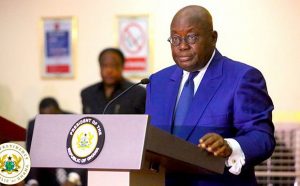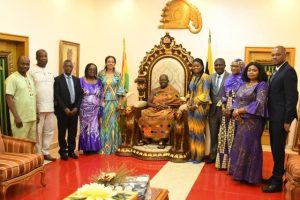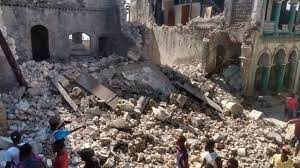President Nana Akufo Addo has said that government is vehemently opposed to any attempt to single out African countries for the imposition of travel bans, as instruments of immigration control.
Akufo Addo’s comments come after the decision by the United States (US), United Kingdom (UK) and European Union (EU) to bar travelers from South Africa, Botswana, Zimbabwe, Namibia, Lesotho, Eswatini, Egypt, Mozambique, Malawi and Nigeria entry into their countries, following the discovery of the Omicron variant of COVID-19 in South Africa.
The President made this known during a joint press conference at Jubilee House, with the President of the Republic of South Africa, Cyril Ramaphosa, as part of a two-day visit to Ghana by the South African leader.
Addressing the media after a close door meeting between the two leaders, President Akufo-Addo reiterated Ghana’s commitment to fighting the Covid 19 pandemic and also touted “Ghana’s unflinching support to South Africa and, indeed, to all other African countries, in the common search for an end to the pandemic”.
He said the visit by the South African President was to re-affirm the ties of cooperation and the bonds of friendship between the two countries, with the two leaders discussing at length how to boost further political and economic relations, cultural and people-to-people exchanges, as well as cooperation at the continental and multilateral levels.
He said the deliberations also centered on driving investment opportunities, domestic and foreign, into both countries, the realization of the 17 SDGs, and the need for enhanced cooperation and partnership in the areas of education, trade and industry, agriculture, defence co-operation, immigration, environment, science and technology, petroleum and hydrocarbon activities, and tourism.
Whilst thanking President Ramaphosa and South Africa for the supporting Ghana’s bid for the Secretariat of the African Continental Free Trade Area (AfCFTA), and for a non-permanent seat at the United Nations Security Council, President Akufo-Addo reiterated that “Ghana will make sure that Africa’s voice is heard loud and clear in the deliberations of the Security Council, both on matters affecting the continent and on global issues, and we will consult broadly to define Africa’s interests”.
He continued, “With the continent confronted by multiple threats to the territorial integrity of some of its states, and many of its civilian populations being put under serious threat, President Ramaphosa and I both agreed that now is not the time for the Security Council to reduce its peacekeeping mandates on the continent”.
President Akufo-Addo applauded President Ramaphosa for the efforts he is making to consolidate the peace in the Southern African Development Community (SADC), with the ongoing SADC mission to crush the violent insurgency in Mozambique’s northern province of Cabo Delgado, in which South African troops are playing a leading role.
“We, in ECOWAS, have much to learn from this, in our own fight against the terrorist threat in the Sahel. President Ramaphosa expressed great interest in this fight, and pledged the support of SADC to ECOWAS within the context of the AU,” he said.
Such cooperation between regional bodies, he added is important for ridding the continent of all the anti-democratic elements who have surfaced, and are seeking to destabilize and threaten the peace and security of Africa, and compromise the efforts at realizing “The Africa we Want”, as enshrined in AU Agenda 2063.
The President noted that “Ghana is determined to deepen her democratic governance, strengthen her institutions of accountability, and put her economy on a strong platform for rapid development. The vision remains that of a Ghana Beyond Aid, a self-reliant Ghana that has freed herself from a mindset of dependence, aid, charity and handouts, and is determined to make intelligent, disciplined use of her considerable resources the basis for her growth and prosperity.”
He assured President Ramaphosa that Ghana will continue to collaborate with South Africa to find solutions to challenges such as the eradication of widespread poverty, elimination of irregular migration, insecurity and human rights violations, terrorism and violent extremism, human and drug trafficking, piracy, as well as climate change and its attendant, negative impact on the environment and livelihoods.







